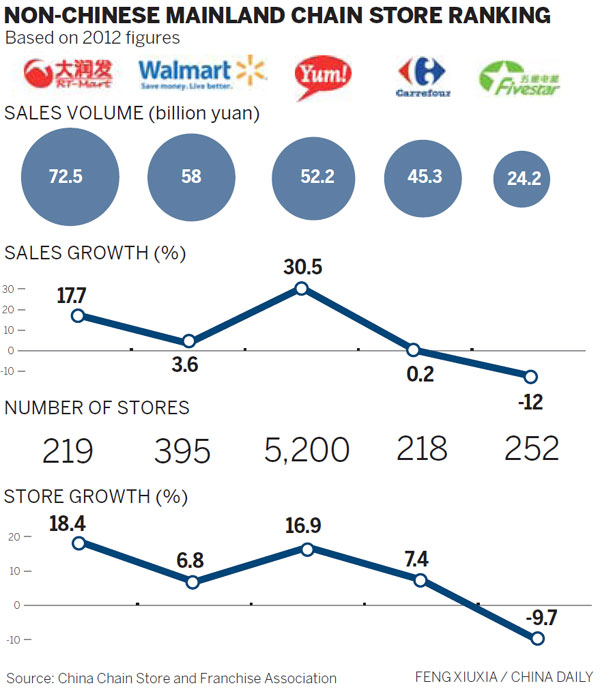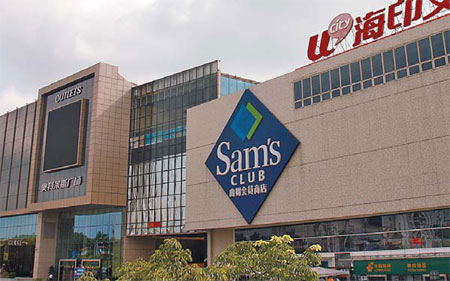More Sam's Club stores set to open
 0 Comment(s)
0 Comment(s) Print
Print E-mail China Daily, July 2, 2013
E-mail China Daily, July 2, 2013
|
|
|
A Sam's Club outlet in Guangzhou, Guangdong province. [China Daily] |
Wal-Mart Stores Inc said it will open more Sam's Club stores - membership-only warehouse clubs targeting affluent Chinese families - in the next two or three years to cope with the slowdown of its hypermarket business.
The world's largest retailer by revenue is expected to open seven Sam's Club stores in the country, said Andrew Miles, senior vice-president and chief operating officer for Sam's Club in China.
Sam's Club, which opened its first store in China in Shenzhen in 1996, has 10 stores in the country. The company provides memberships for individual shoppers and business customers, but the majority of its clients are individual shoppers.
There are 620 Sam's Club stores in the United States, generating $49 billion in sales annually. The company is the eighth biggest retail business in the US.
On Saturday, a store which opened in Suzhou - a third-tier city in affluent Jiangsu province - became the 799th Sam's Club in the world. The company has international sales of $58 billion annually.
"While people say that retail is detail, clubs are also discipline models," Miles said.
A 30-year retail veteran, with 20 years at the A.S. Watson Group, Miles said that running a club business is far more difficult than running an ordinary retail business.
"We are a disciplined, focused, low-cost operation," he said. "Not easy."
Sam's Club customers have to pay 150 yuan per year ($24.23) for shopping at the stores. Miles said that the membership fees make them think differently about their operations because their customers expect more, and they have to work hard to make sure that they are satisfied.
Most stores have a flat layout and simple, open environments, with high ceilings and LED lighting, keeping their operations efficient, Miles said.
Having fewer items in the clubs than in supermarkets is one of the ways for the company to keep the prices low.
And to reduce costs further, the stores' buying teams select the right products for their members and try to reduce other expenses, including display areas and logistics.
The buying teams are essential for the success of membership stores like Sam's Club. Due to the reduced availability of some products, the buyers' task of picking the right products becomes very important.
The company has a team of 90 people at its headquarters in Shenzhen and four regional offices in charge of local purchases.
Buying for clubs is very different than purchasing products for other retailers, Miles said.
"Buyers need to think like members," he said. "A buyer has to take risks and has to be very brave because they have to choose one or two items in one category."
Sam's Club operations in China are selling some items in large quantities and with significant profits.
For instance, last year, the company sold 2,000 tons of wine and liquor, and about 500 high-end Japanese massage chairs priced at 35,000 yuan.
The company's model has been successful in China, and the time is now right to open more stores and expand the market, Miles said, adding that it usually takes two to three years to establish the brand and the store in a community.
The growth pace for Sam's Club stores has been solid.
"Two years ago, we had six clubs. Now we have 10," said Raymond Bracy, senior vice-president of corporate affairs and sustainability for Wal-Mart China.
The rapid development of Sam's Club is in sharp contrast with Wal-Mart's decision to close some stores in recent months, resulting in questions and doubts over foreign retailers' plans in the Chinese market.
France's Carrefour SA closed six stores in China from 2010 to 2012, while the United Kingdom's Tesco Plc shut four stores last year.
Bracy said that it's a natural decision to close stores because things change fast in the Chinese market. "We will open far more stores than we closed," he said.
Sam's Club has more than 1.1 million members and the recurring membership rate is at more than 70 percent a year.
Hermann Ng, CEO of Retail Nation, a consultancy firm based in Shanghai, said that now is the time for Sam's Club to expand in China after an initial stage.
But he said that Sam's Club expansion doesn't necessarily mean less growth for Wal-Mart's hypermarkets, which have suffered from a rapid expansion and acquisition strategy and now face a required consolidation period.
Ng said that he believes that Sam's Club's strategy is going to work out in China and contribute more profits to Wal-Mart than its hypermarket format.








Go to Forum >>0 Comment(s)